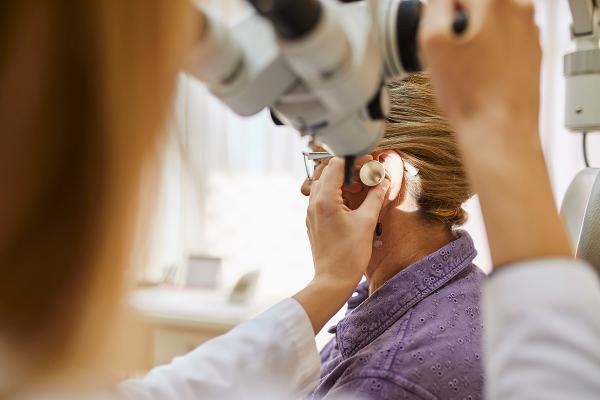
AARP Hearing Solutions helps members access hearing care professionals, no-cost hearing exams and more.
It may take some time to get used to these devices. Read on for tips about making the transition smoother.

So, you’re thinking about getting over-the-counter (OTC) hearing aids. These devices work by making sounds louder. You can buy them online or in a store without a prescription. And they may be a good option for people with self-diagnosed mild to moderate hearing loss.1
This type of hearing difficulty is often situational, says Bria Collins, Au.D. She’s the associate director of audiology practices at the American Speech-Language-Hearing Association. For example, you might have trouble hearing conversations in a crowded restaurant, or you may need to turn the volume up on your phone.
What can you expect when you start to wear OTC hearing aids? It may take your brain some time to adjust. There will also be a learning curve.
Here’s why: There’s a lot of do-it-yourself involved when you wear OTC hearing aids. There are many different models available. And no matter what type you buy, you adjust them yourself.2 That’s different than with prescription hearing aids, where the settings are matched to your hearing loss by a professional.1 So it helps to be tech-savvy, says Collins.
Not good at figuring out gadgets? Consider going to a hearing care professional, such as an audiologist or hearing instrument specialist, for a hearing exam and consultation first. If you belong to AARP, you can get a no-cost hearing exam and consultation without a referral through AARP® Hearing Solutions™ provided by UnitedHealthcare Hearing. The program also offers discounts on hearing aids.
Once you decide that OTC is the way to go, you’re ready to start using them. Here’s what to know during those first days and weeks.

AARP Hearing Solutions helps members access hearing care professionals, no-cost hearing exams and more.
The first day is typically the most challenging. As you get started, be sure to read the directions that come with your hearing aids before putting them in.
New hearing aids are like getting a new pair of glasses, though — at first, the difference can be a little jarring. So, give yourself time to adjust.
“If your hearing aids feel a little strange, wear them for 2 hours. Then give yourself a break and take an hour off,” says Collins. Think of it like breaking in a new pair of shoes, she explains. “You want to build up your tolerance of having something in your ear.”
Also good to know on day 1:
Your voice may sound louder. It’s common for new hearing aid users to experience something called the “occlusion effect.” That’s when your own voice sounds louder inside your head, according to the National Institute on Deafness and Other Communication Disorders.3
“When you’re wearing a hearing aid, your mouth is only 6 inches from the microphone, so your voice is going to sound louder to you,” says Collins. Most people get used to this with time.
Sounds may be louder too. Background noise that might not have been completely clear before will most likely become more noticeable. That includes chirping birds, honking horns, the hum of the fridge or even your own footsteps.4
“Once you start wearing the hearing aids, things may sound a little loud because you’re reintroducing those sounds to the brain,” says Collins. Eventually though, your brain will get used to them. So be patient.
“If your OTC hearing aids are working properly, your hearing will most likely be clearer and you’ll be saying ‘what?’ a lot less,” explains Collins. “Another noticeable improvement is that you’ll start hearing consonants you weren’t hearing before.”
Most people who have trouble hearing have high-frequency pitch loss. That makes it harder to distinguish certain sounds, such as the s, k, f or th sounds. “When you’ve been wearing the hearing aids during the first week, hearing those consonants should be a bit easier,” says Collins.
Just don’t expect your hearing to automatically go to 100% in a week, says Collins. But you should see improvement.
By the end of the week, you’ll probably have figured out how to adjust your hearing aids so that they fit more comfortably. And found the right volume settings. If not, many OTC hearing aids come with phone- or app-based customer service to help you troubleshoot.5 Some models even come with the option for virtual appointments with a hearing specialist.
Other things to do in week 1:
Get serious about cleaning. During the first week, you’ll probably master how to put the devices in and take them out. But because you take them out at bedtime every night, it’s also good to become a pro at cleaning them.
Make sure you’re doing it nightly, too. Hearing aids tend to collect earwax and other debris during the day. “A lot of the OTC devices come with a cleaning tool, but you can also wipe the hearing aid with a microfiber cloth,” says Collins.
Keep them dry. Store your hearing aids in a cool, dry place, away from heat and moisture. Consider buying a special dryer or dehumidifier for your hearing aids. These small storage containers pull out any excess moisture from your devices.
And don’t swim or shower with your hearing aids on, says Collins. If you sweat a lot while you exercise, consider buying sweatbands to keep your hearing aids dry.
It can take 3 to 4 weeks to adjust to the various settings in your hearing aids.6 You’ll want to be sure that the devices are comfortable. Wearing them regularly will also help you adjust to the many different sounds around you.7
Are you still having trouble making out speech in quiet rooms? Or hearing conversations in restaurants? Your hearing loss may be more severe than you think. In that case, you may need to talk with a hearing care professional about prescription hearing aids.2
Next step? Request an appointment with a hearing care professional. They’ll steer you to the right pair. After all, your hearing is priceless, and a pair of good hearing aids is an investment.
Are you ready to shop for OTC hearing aids? Use this simple tool to find the right OTC device for you. Start now.
Sources
Information is for educational purposes only and is not a substitute for the advice of a licensed medical provider. Consult your provider prior to making changes to your lifestyle or health care routine.
AARP Hearing Solutions is available to all AARP members and does not require a health insurance plan from UnitedHealthcare. The AARP hearing program discount cannot be combined with any other discounts, promotions, coupons or hearing aid benefit plans unless noted herein. Products or services that are reimbursable by federal programs including Medicare and Medicaid are not available on a discounted or complimentary basis. AARP commercial member benefits are provided by third parties, not by AARP or its affiliates. Providers pay a royalty fee to AARP for the use of its intellectual property. These fees are used for the general purposes of AARP. Some provider offers are subject to change and may have restrictions. Please contact the provider directly for details. UnitedHealthcare Hearing is provided through UnitedHealthcare, offered to existing members of certain products underwritten or provided by UnitedHealthcare Insurance Company or its affiliates to provide specific hearing aid discounts. This is not an insurance nor managed care product, and fees or charges for services in excess of those defined in program materials are the member's responsibility. UnitedHealthcare does not endorse nor guarantee hearing aid products/services available through the hearing program. This program may not be available in all states or for all group sizes. Components subject to change.
Network size varies by market.